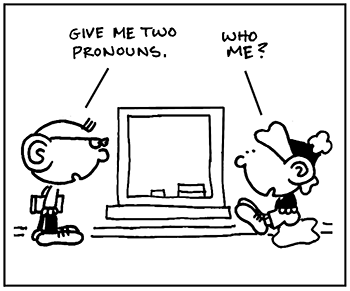Pronouns are small words that take the place of a noun. Pronouns are words like: he, you, ours, themselves, some, each... We can use a pronoun instead of a noun. If we didn't have pronouns, we would have to repeat a whole lot of nouns. The following pages describe the grammar of pronouns.
- What is a Pronoun?
pronoun (noun): a word that takes the place of or represents a noun
Pronouns are small words that take the place of a noun. We can use a pronoun instead of a noun. Pronouns are words like: he, you, ours, themselves, some, each... If we didn't have pronouns, we would have to repeat a lot of nouns. We would have to say things like:
- Do you like the manager? I don't like the manager. The manager's not friendly.
With pronouns, we can say:
- Do you like the manager? I don't like him. He's not friendly.
A pronoun is a small word with a big job. In fact, a pronoun can take the place of an entire noun phrase. In this way, pronouns help us use fewer words and avoid repetition.
In the sentence "Please give this letter to Rosemary", we can replace "this letter" with "it" and "Rosemary" with "her", as you see below:
| Please give | this letter | to | Rosemary. |
| Please give | it | to | her. |
In a conversation, the speakers normally use pronouns to address each other: I speak to you. You speak to me. When we talk about John, we don't keep repeating John's name. We say he or him. If we talk about a thing, we can use the pronoun it.
A pronoun represents the person or thing that we are talking about (as long as we know which person or thing we are talking about). We don't usually start a discourse with a pronoun. We start with a noun and then move on to use a pronoun to avoid repeating the noun.
By "noun", we really mean: noun (food), name (Tara), gerund (swimming), noun phrase (twelve red roses). We can replace even a long noun phrase such as "the car that we saw crashing into the bus" with the simple pronoun "it".
Here are some examples of noun phrases and the pronouns that could replace them:
| noun (phrase) | pronoun |
|---|---|
| the car | it |
| Anthony | he |
| the big woman with black hair | she |
| swimming | it |
| learning English | it |
| almost all French people | they |
| my wife and I | we |
pro + noun = "on behalf of" + noun
There are different types of pronoun, but they all have the same job - to represent a noun (phrase).
Easy Pronoun Rules
Here are 5 easy rules and tips to help you avoid mistakes with English pronouns. For more comprehensive rules please look under the appropriate pronoun on our pronoun grammar pages.
1. A personal pronoun AGREES with the noun it replaces.
- Those cars are nice. They look expensive.
- John works hard. He will do well.
- That woman is my teacher. Do you know her?
- My friend and I are going shopping. Like to join us?
2. DO NOT place an adjective before a personal pronoun. A subject personal pronoun can have an adjective AFTER the verb. (Exceptions are fixed phrases like poor me, lucky you.)
- NOT
handsome him, red them - NOT
beautiful she, dangerous it, clever they - She looked beautiful. It was dangerous. They are clever.
3. Pronouns NEVER have an apostrophe ('). Do not add an apostrophe to possessive pronouns like hers, ours, theirs. (If you see an apostrophe, you are looking at a contraction.)
- The red bag is hers and the blue bag is ours. (NOT The red bag is
her'sand the blue bag isour's.) - One must do it oneself. (NOT
one's self) - He's finished. (contraction = He is)
- It's started. (contraction = It has)
4. My is NOT a pronoun. A pronoun replaces a noun. In "This is my bag" the word my describes bag (it is a possessive determiner). In "This bag is mine" the word mine replaces my bag (it is a real pronoun). The same is true of your, its, our, their - they are possessive determiners. His and her can be pronoun OR possessive determiner.
- Is this your car? (possessive determiner)
- Where are our keys? (possessive determiner)
- Jo sold his car. (possessive determiner)
- He took my hand in his. (possessive pronoun)
- She loved her work. (possessive determiner)
- I agreed to wait for her. (personal pronoun)
5. DON'T put yourself first! It is good manners to put the other person before you. (This is not a question of grammar - just manners.)
- My wife and I are going swimming. (NOT
I and my wifeare going swimming) - Ram, Tara and I went home. (NOT
I, Ram and Tarawent home) - This is for you and me. (NOT This is for
me and you) - They took John and me to the beach. (NOT They took
me and Johnto the beach)
Pronoun Types

Tidak ada komentar:
Posting Komentar